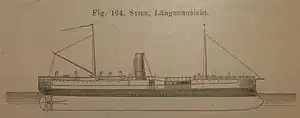HNLMS Stier
HNLMS Stier was a Schorpioen-class monitor built in England for the Royal Netherlands Navy in the 1860s.
 Stier | |
| History | |
|---|---|
| Name | Stier |
| Namesake | Bull |
| Builder | John Laird, Son & Company, Birkenhead, England |
| Launched | 5 April 1868 |
| Recommissioned | 1 April 1909 |
| Decommissioned | 1982 |
| In service | 1868 |
| Out of service | 1906 |
| Stricken | 1908 |
| Fate | Scrapped, 1930 |
| General characteristics (as completed) | |
| Class and type | Schorpioen-class monitor |
| Displacement | 2,087 metric tons (2,054 long tons) |
| Length | 195.7 ft (59.65 m) (p/p) |
| Beam | 39 ft (11.9 m) |
| Draught | 16 ft 9 in (5.1 m) |
| Installed power | |
| Propulsion | 2 shafts, 2 steam engines |
| Speed | 12 knots (22 km/h; 14 mph) |
| Range | 1,030 nmi (1,910 km; 1,190 mi) at 10 knots (19 km/h; 12 mph) |
| Complement | 136 |
| Armament | 2 × 1 − Armstrong 9-inch (229 mm) muzzle-loading rifles |
| Armour |
|
Design and description
The Schorpioen-class ships were designed to the same specification, but varied somewhat in details. The dimensions here are for Schorpioen, with her British-built sister ship, Stier, being marginally smaller. They were 205 feet (62.5 m) long overall, had a beam of 38 feet (11.6 m) and a draft of 16 feet 2 inches (4.9 m). They displaced 2,069–2,175 long tons (2,102–2,210 t) and was fitted with a ram bow. Their crew consisted of 110–136 officers and enlisted men.[1]
Stier was powered by a pair of horizontal trunk steam engines, each driving a propeller shaft using steam from four square boilers. The engines produced 2,225–2,250 indicated horsepower (1,659–1,678 kW) and gave the ship a speed of 12 knots (22 km/h; 14 mph).[1] The Schorpioen-class ships carried a maximum of 200 long tons (203 t) of coal that gave them a range of 1,030 nautical miles (1,910 km; 1,190 mi) at a speed of 10 knots (19 km/h; 12 mph).[2] They were also equipped with two pole masts.[3]
The Schorpioens were armed with a pair of Armstrong 9-inch (229 mm) rifled, muzzle-loading guns mounted in the gun turret. The ships had a complete waterline belt of wrought iron that ranged in thickness from 6 inches (152 mm) amidships to 3 inches (76 mm) at the ends of the ships. The gun turret was protected by 8 inches (203 mm) inches of armor and the armor thickness increased to 11 inches (279 mm) around the gun ports. The base of the turret was also protected by 8 inches of armor and the walls of the conning tower were 5.7 inches (144 mm) thick. The deck armor ranged in thickness from 0.75 to 1 inch (19 to 25 mm).[2]
Notes
- Silverstone, p. 340
- "Dutch Ironclad Rams", pp. 303–304
- Gardiner, p. 373
References
- Gardiner, Robert, ed. (1979). Conway's All the World's Fighting Ships 1860–1905. Greenwich: Conway Maritime Press. ISBN 0-8317-0302-4.
- "Dutch Ironclad Rams". Warship International. IX (3): 302–304. 1972.
- Silverstone, Paul H. (1984). Directory of the World's Capital Ships. New York: Hippocrene Books. ISBN 0-88254-979-0.
External links
 Media related to Hr.Ms. Stier (ship, 1868) at Wikimedia Commons
Media related to Hr.Ms. Stier (ship, 1868) at Wikimedia Commons